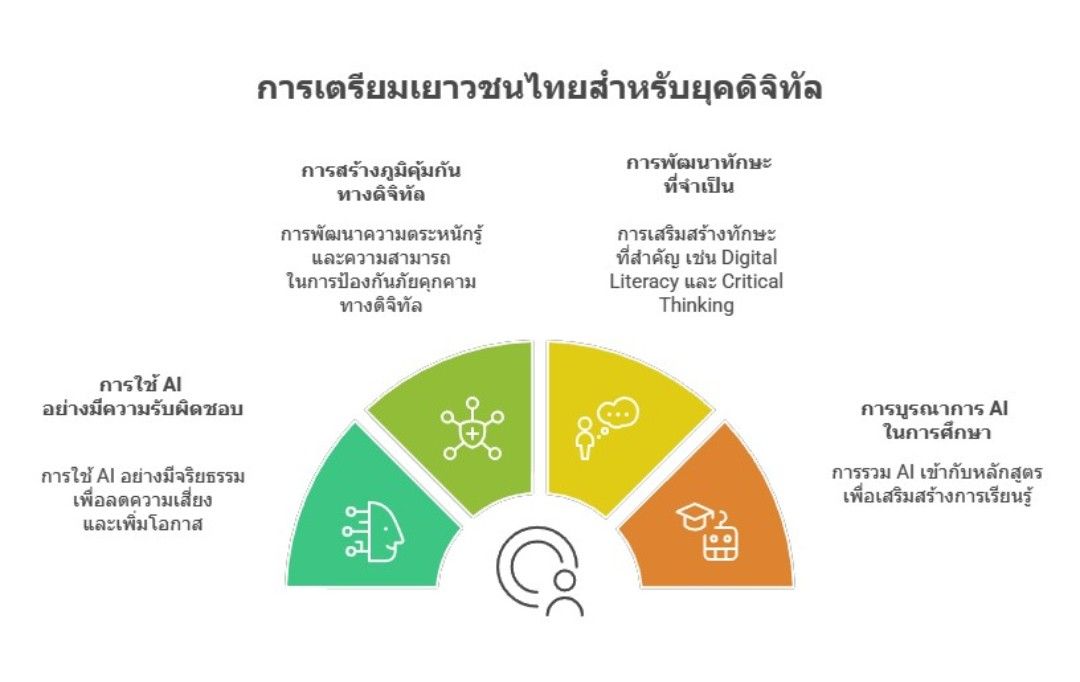The Responsibilities of Thai Children in The AI Era: Adapting, Learning, and Creating Value in A Globalized World
Main Article Content
Abstract
This academic article presents the responsibilities of Thai children in the era of artificial intelligence (AI), emphasizing adaptation, learning, and value creation in a globalized world. The study reveals that in the 21st century, advancements in AI and globalization significantly impact the lifestyles of Thai youth, presenting both opportunities and challenges, particularly concerning issues of discipline, responsibility, and digital literacy, which affect harmonious coexistence in a digital society. The basic education curriculum designates “responsibility” as a necessary trait for living in modern society. While AI offers opportunities for personalized learning and effective classroom management, it also poses ethical risks, such as algorithmic bias and violations of privacy. Therefore, it is essential for youth to develop critical judgment, ethical standards, and informed skills in utilizing AI. The article proposes strategies for cultivating responsibility among youth through the integration of digital skills, critical thinking, and AI literacy, utilizing learner-centered activities, including case study analysis and community-benefiting projects. Recommendations highlight the importance of fostering a culture of integrity and responsibility in technology use to ensure that Thai youth grow into quality digital citizens who actively contribute to the sustainable development of Thai society in the era of globalization.
Article Details

This work is licensed under a Creative Commons Attribution-NonCommercial-NoDerivatives 4.0 International License.
References
กรกมล ศรีวัฒน์. (2567). เมื่อการศึกษาเผชิญหน้า AI: แง่มุมไหนที่การศึกษาไทยต้องเตรียมตัว. สืบค้นจาก https://www.eef.or.th/clip-ai-for-teaching-and-learning/.
กรวรรณ คำกรเกตุ และ อุนิษา เลิศโตมรสกุล. (2564). การสร้างภูมิคุ้มกันในเด็กและเยาวชนต่อการป้องกันจากการตกเป็นเหยื่ออาชญากรรมและเป็นผู้กระทำผิดในสังคม. วารสารคุณภาพชีวิตกับกฎหมาย, 17(1), 1-16.
กองทุนพัฒนาสื่อปลอดภัยและสร้างสรรค์. (2567). Digital literacy: ทักษะการเข้าใจและรู้เท่าทันสื่อดิจิทัล. สืบค้นจาก https://blog.think-digital.app/2024/07/01/digital-literacy/.
ชไมพร ไกยสิทธิ์. (2566). การจัดการเรียนรู้ที่สอดคล้องกับกระแสโลกาภิวัตน์เพื่อพัฒนาเยาวชนสู่ความเป็นพลเมืองโลก. วารสารสถาบันวิจัย, 10(1), 185-195.
ชารีวัฒน์ ถวิลวงษ์. (2568). การพัฒนาผู้เรียนด้านปัญญาและคุณธรรมจริยธรรมในยุค AI. Journal of Buddhist Education and Research, 11(3), 626-634.
ธีระ กุลสวัสดิ์. (2567). อาชญากรรมไซเบอร์: ศึกษากรณีการหลอกให้ลงทุน (รายงานวิจัย). ชลบุรี: คณะรัฐศาสตร์และนิติศาสตร์ มหาวิทยาลัยบูรพา.
โธมัส กวาดามูซ, ณัฐรัชต์ สาเมาะ และ วรวลัญช์ วรัชวรวัลย์. (2566). ภูมิคุ้มกันในโลกดิจิทัล (Digital resilience): ทักษะที่เด็กและเยาวชนไทยยุคใหม่ต้องมี. สืบค้นจาก https://mahidol.ac.th/musef/%E0%B8%A0%E0%B8%B9%E0%B8%A1%E0%B8%B4%E0%B8%84%E0%B8%B8%E0%B9%89%E0%B8%A1%E0%B8%81%E0%B8%B1%E0%B8%99%E0%B9%83%E0%B8%99%E0%B9%82%E0%B8%A5%E0%B8%81%E0%B8%94%E0%B8%B4%E0%B8%88%E0%B8%B4%E0%B8%97%E0%B8%B1/.
ประภาพรรณ วิภาตวิทย์. (2567). การสร้างอนาคตของการเรียนรู้: บทบาทของ AI ในยุคการศึกษา 4.0. สืบค้นจาก https://bdi.or.th/movements/ai-education/.
เผด็จ จงสกุลศิริ. (2568). จริยธรรมในการใช้เทคโนโลยีดิจิทัล: ความท้าทายและแนวทางในการสร้างสังคมดิจิทัลที่ยั่งยืน. วารสารพุทธพัฒนศาสตร์ศึกษา, 3(1), 1-22.
พรรณพิลาศ กุลดิลก. (2560). การขับเคลื่อนสังคมผ่านสื่อใหม่ในยุคโลกาภิวัตน์. วารสารวิชาการมนุษยศาสตร์และสังคมศาสตร์, 25(49), 62.
พีรวิชญ์ คำเจริญ และ วีรพงษ์ พลนิกรกิจ. (2561). เด็กกับการรู้เท่าทันดิจิทัล. วารสารวิชาการนวัตกรรมสื่อสารสังคม, 6(2), 22-31.
มหาวิทยาลัยหอการค้าไทย. (2568). เด็กเจนใหม่ใช้ AI อย่างไรให้ฉลาดขึ้น ไม่ใช่แค่สะดวกขึ้น. สืบค้นจาก https://ece.utcc.ac.th/blogs/gen-z-guide-to-using-ai-wisely/.
ลัดดา บุญเรืองศรี. (2563). ปัญหาทางกฎหมายในการคุ้มครองมาตรการทางเทคโนโลยี ตามพระราชบัญญัติลิขสิทธิ์ พ.ศ. 2537. (นิติศาสตรมหาบัณฑิต, มหาวิทยาลัยธุรกิจบัณฑิตย์).
วุฒิชัย ดานะ. (2566). จริยธรรมในยุคปัญญาประดิษฐ์: การเตรียมนักเรียนสำหรับอนาคต. วารสารวิชาการจินตาสิทธิ์, 1(3), 167-178.
ศุภพล ทองอินทร์ และ อุทิศ บำรุงชีพ. (2568). คอพพีลีค: เทคโนโลยีปัญญาประดิษฐ์สร้างสรรค์การตรวจสอบการคัดลอกผลงานทางวิชาการ เสริมสร้างทักษะการเคารพเขาเคารพเราบนโลกดิจิทัล. วารสารนวัตกรรมการบริหารและการจัดการศึกษา, 3(1), 121-134.
สำนักงานส่งเสริมสังคมแห่งการเรียนรู้และคุณภาพเยาวชน (สสค.). (2559). ความฉลาดทางดิจิทัล (Digital intelligence: DQ) ที่จำเป็นสำหรับเด็กในศตวรรษที่ 21. สืบค้นจาก http://www.qlf.or.th/Home/Contents/1137.
สุภัทรชัย สีสะใบ, พระครูสุธีกิตติบัณฑิต (กฤษฎา กิตฺติโสภโณ), พระปลัดระพิน พุทฺธิสาโร และ พระครูสมุทรปริยัตยาภรณ์ (นพพล กนฺตสีโล). (2567). เยาวชนไทยกับแนวทางการพัฒนาศักยภาพสู่การเป็นพลเมืองดิจิทัลในสังคมวิถีใหม่. วารสาร มจร สังคมศาสตร์ปริทรรศน์, 13(6), 451-464.
American Academy of Pediatrics Council on Communications & Media. (2024). How will artificial intelligence (AI) affect children?. Retrieved from https://www.healthychildren.org/English/family-life/Media/Pages/how-will-artificial-intelligence-AI-affect-children.aspx.
Anderson, A. (2025). Legal and ethical risks of using AI in hiring. Retrieved from https://info.recruitics.com/blog/legal-and-ethical-risks-of-using-ai-in-hiring.
Mossberger, K. (2009). Toward digital citizenship: Addressing inequality in the information age. In Chadwick, A., & Howard, P. N. (Eds.)., Routledge handbook of Internet politics (pp. 173-185). New York: Routledge.
NEUROGENIU. (2564). 10 ทักษะสำคัญ ที่เด็กยุคนี้ควรมี. สืบค้นจาก https://www.neurogenius.com/blog/r/36/10-%E0%B8%97%E0%B8%B1%E0%B8%81%E0%B8%A9%E0%B8%B0%E0%B8%AA%E0%B8%B3%E0%B8%84%E0%B8%B1%E0%B8%8D%E0%B8%97%E0%B8%B5%E0%B9%88%E0%B9%80%E0%B8%94%E0%B9%87%E0%B8%81%E0%B8%A2%E0%B8%B8%E0%B8%84%E0%B8%99%E0%B8%B5%E0%B9%89%E0%B8%84%E0%B8%A7%E0%B8%A3%E0%B8%A1%E0%B8%B5.
Ribble, M. (2015). Digital citizenship in schools: Nine elements all students should know. (3rd ed.). Washington DC.: International Society for Technology in Education.
TOJO News. (2568). พลเมืองยุคดิจิทัล: สิทธิและความรับผิดชอบในโลกออนไลน์. สืบค้นจาก https://today.line.me/th/v3/article/yz9EYK6.

